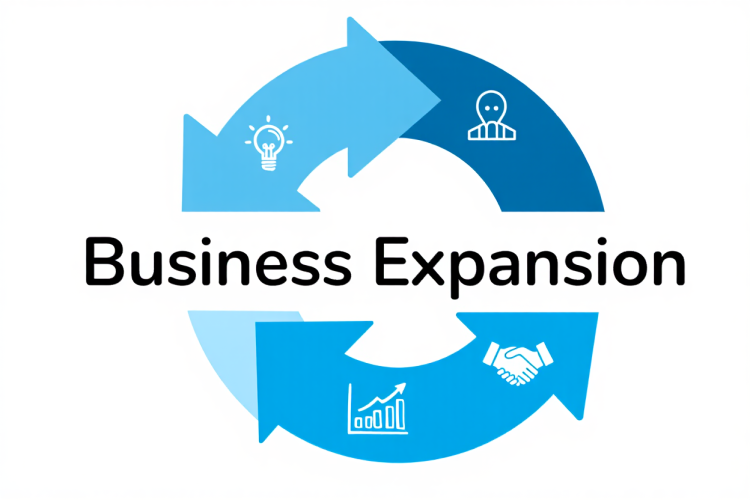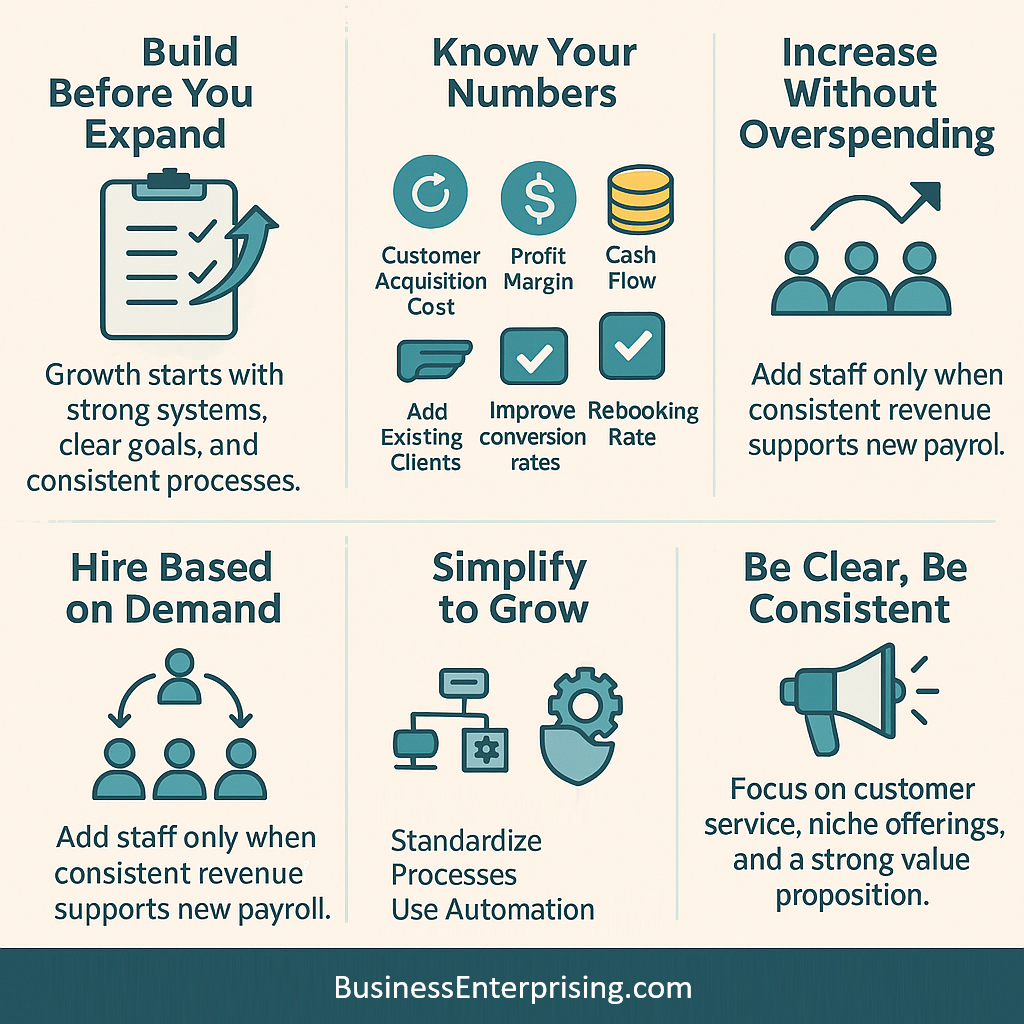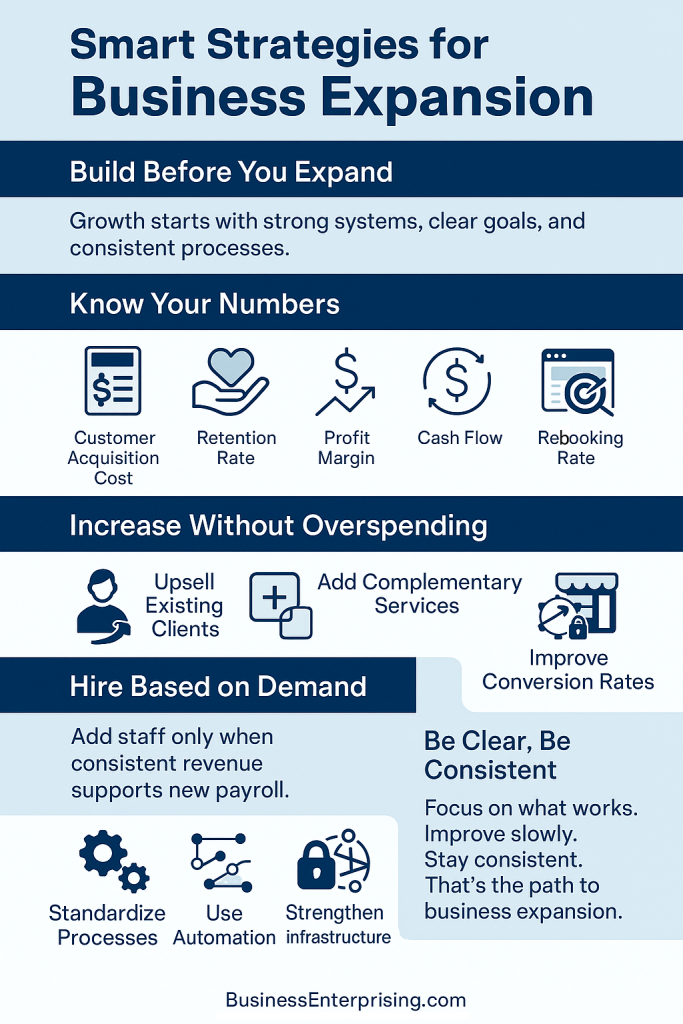 Running a business takes more than hard work. You also need smart systems and clear goals. Without both, growth gets messy fast. Business expansion only works when you build on a solid foundation. Adding new services or locations too soon creates more problems than progress.
Running a business takes more than hard work. You also need smart systems and clear goals. Without both, growth gets messy fast. Business expansion only works when you build on a solid foundation. Adding new services or locations too soon creates more problems than progress.
Additionally, success depends on your ability to measure and adjust. Metrics like retention and profit margin guide the decisions that shape your future. However, knowing what to track is just the beginning. You also need to act on what the numbers show. Ignoring data leaves you guessing.
Therefore, it helps to focus on what you can control. Improve what you already do well. Then look for ways to do it faster or more efficiently. That’s how real growth begins. Too many businesses scale without fixing small gaps first. Those gaps get wider with each new customer or hire.
You don’t need complex tools or expensive consultants to grow. Most solutions start with better communication, simpler processes, and consistent follow-through. However, you must take the time to review what’s working and what’s not. Even five minutes a week can show you where to improve.
Building a stronger business isn’t about doing more. It’s about doing the right things more consistently. Keep your goals clear and your systems lean. Over time, you’ll have more time, more clients, and fewer problems. Growth doesn’t have to be fast. It just has to make sense.
How can I attract more customers?
Focus on targeted marketing, strong branding, and delivering consistent value to your ideal audience.
Attracting more customers starts with knowing exactly who you want to reach. You need to define your ideal audience clearly. Without that, your marketing efforts may miss the mark and waste your time. Targeted marketing helps you focus your budget on people most likely to buy from you.
Additionally, your brand must speak directly to your customers’ needs. Keep your messaging simple and consistent across every channel. Your logo, tone, and visuals should reflect your values and offerings. A strong brand builds trust and sets you apart from competitors. Customers tend to return to brands they recognize and feel good about.
Therefore, think about how you can deliver ongoing value. Offer solutions to your customers’ problems, not just products or services. Consider how your business can become part of their routine. Consistent value keeps people engaged and encourages word-of-mouth referrals. That can lead to steady business expansion without needing constant promotions.
However, you must also track your results. Watch how people respond to emails, social posts, or promotions. Adjust your strategies based on what works best. Test new offers, messages, or platforms regularly. Marketing is never one-size-fits-all, and your audience may change over time.
You don’t need a large budget to attract more customers. What matters most is relevance and consistency. Keep showing up with something meaningful. Over time, your brand becomes familiar and trusted. That’s when people start reaching out to you.
What’s the best way to increase revenue?
Increase revenue by upselling existing clients, expanding your offerings, and improving conversion rates.
The best way to increase revenue is to start with your current clients. They already trust you and know your services. Upselling is more efficient than chasing new leads. Recommend additional services that match what they already use. Offer upgrades or bundled options that add value without feeling like a hard sell.
Additionally, expanding your offerings can bring in new revenue. Add services that solve related problems or fill common gaps. Make sure every new offer fits your brand and speaks to your target market. New services can attract fresh clients while giving current ones a reason to return. Business expansion often starts with small changes like this.
However, none of that matters if people don’t convert. Focus on improving your conversion rates before adding more marketing. Review your website, email campaigns, and intake processes. Small tweaks in copy or design can increase sales. Make it easy for people to take action with simple steps and clear language.
Therefore, train your team to look for new opportunities. A well-informed employee can spot when a client might need something more. Consistent training can turn everyday conversations into more revenue. Keep scripts natural, but teach the value of recommending the right service at the right time.
You don’t need to do everything at once. Start with one method and measure your results. The goal is consistent growth through smart decisions, not guesswork. Over time, these strategies support higher profits and long-term stability.
When should I hire more employees?
Hire when demand exceeds your capacity and consistent revenue can support new payroll expenses.
The best way to increase revenue is to start with your current clients. They already trust you and know your services. Upselling is more efficient than chasing new leads. Recommend additional services that match what they already use. Offer upgrades or bundled options that add value without feeling like a hard sell.
Additionally, expanding your offerings can bring in new revenue. Add services that solve related problems or fill common gaps. Make sure every new offer fits your brand and speaks to your target market. New services can attract fresh clients while giving current ones a reason to return. Business expansion often starts with small changes like this.
However, none of that matters if people don’t convert. Focus on improving your conversion rates before adding more marketing. Review your website, email campaigns, and intake processes. Small tweaks in copy or design can increase sales. Make it easy for people to take action with simple steps and clear language.
Therefore, train your team to look for new opportunities. A well-informed employee can spot when a client might need something more. Consistent training can turn everyday conversations into more revenue. Keep scripts natural, but teach the value of recommending the right service at the right time.
You don’t need to do everything at once. Start with one method and measure your results. The goal is consistent growth through smart decisions, not guesswork. Over time, these strategies support higher profits and long-term stability.
How do I scale my operations effectively?
Standardize processes, invest in automation, and ensure your infrastructure can handle growth before expanding.
Scaling your operations effectively starts with consistency. You need to standardize your processes before adding more people or locations. Without clear procedures, growth creates confusion. Teams should follow the same steps every time to avoid mistakes and delays. Document your workflows so training becomes simple and repeatable.
Additionally, look for tasks you can automate. Manual work slows you down and increases errors. Automation tools reduce repetitive tasks and improve accuracy. This frees up your team to focus on what matters. However, you should test systems on a small scale before fully committing. Make sure they work well with your current operations.
Therefore, review your infrastructure. Systems must support higher volumes before business expansion can happen. Check your scheduling, billing, and communication tools. If those break under pressure, growth won’t be sustainable. Fix the gaps before increasing your client base. Your tech should support efficiency, not slow you down.
However, don’t try to scale everything at once. Start with one area that causes the most friction. Solve that, then move to the next. Scaling is about doing more with less effort. Each improvement should make your business more stable, not more chaotic.
You need clear goals and consistent systems to scale well. Guessing your way through it doesn’t work. Take time to build the foundation now. That way, you’re ready when more demand comes. The smoother your operations run, the easier growth becomes.
What are the most important metrics to track?
Monitor KPIs like customer acquisition cost, retention rate, profit margin, and cash flow.
Knowing which metrics to track can help you make smarter decisions and avoid wasting time or money. Start with the basics. Customer acquisition cost shows how much you spend to get each new client. If this number gets too high, your profits shrink fast.
Additionally, track your retention rate. It costs less to keep a customer than to find a new one. Retention tells you if people are coming back. When they don’t, you need to find out why. Fixing client retention often improves revenue without raising expenses.
Therefore, monitor your profit margins. Revenue means nothing if your expenses eat it up. Profit margin shows how much you actually keep. Review it by product, service, or department. That tells you what’s working and what’s not. However, don’t ignore your cash flow. You need enough cash to pay staff, suppliers, and yourself. A profitable business can still go under if cash runs out.
Also, think about how these metrics affect growth. You can’t plan business expansion if you don’t know your numbers. KPIs help you decide where to focus and when to adjust. Review them monthly, not just once a year. Trends are easier to catch early when you track regularly.
You don’t need dozens of metrics. Just start with a few that tie to your goals. Make time to review them often. That habit keeps you grounded and focused. As your business grows, the right data will keep your decisions clear.
How do I stand out from competitors?
Differentiate through superior customer service, niche specialization, and a clear value proposition.
Standing out from competitors means offering something they don’t. Your edge might be service, expertise, or how you solve a problem. You don’t need to be the cheapest or flashiest. You just need to be the best fit for your ideal customer.
Additionally, focus on niche specialization. Serving a narrow market helps you become known as the go-to provider. People trust businesses that understand their specific needs. General services attract everyone but impress no one. However, a clear focus helps you speak directly to the right audience. That builds loyalty and drives repeat business.
Therefore, define your value proposition. Be clear about what makes your service different and why it matters. Clients should know immediately why they should choose you. Keep your message simple and use it across all platforms. If you confuse people, they leave.
Superior customer service also sets you apart. People remember how you treat them. Quick replies, friendly staff, and a clean space go a long way. Consistency matters more than perfection. Happy clients come back and tell others. That gives you steady growth without constant advertising.
Business expansion starts with a solid reputation. You grow by being reliable, not just by adding more. Stay focused on what works. Then build around that. Your difference becomes your strength when you stay true to it. That’s how you outlast competitors.
Conclusion
Growing your business takes consistent effort and clear direction. You don’t need to do everything at once to see progress. Start small and focus on what works. Then repeat those steps until they feel natural. Most growth happens through simple, steady action.
Additionally, trust the numbers. Metrics tell you what to improve and where to shift your focus. Guessing leads to wasted time and money. However, tracking results keeps you grounded and reduces stress. Use your data to guide daily decisions, not just yearly goals.
Therefore, stay close to your customers. Listen to their feedback and watch their behavior. People often show you what they want. Improving service can lead to more sales without changing much. A strong reputation builds trust faster than any ad.
Business expansion doesn’t need to be fast to be effective. What matters more is building a structure that lasts. Rushing leads to mistakes that are hard to fix later. However, steady growth gives you room to adjust and improve along the way.
You already have what you need to grow. Focus on your strengths and solve real problems. Avoid chasing trends or copying others. The best results come when you stay consistent and pay attention. Over time, small wins lead to lasting success. Keep it simple, stay patient, and move forward.



